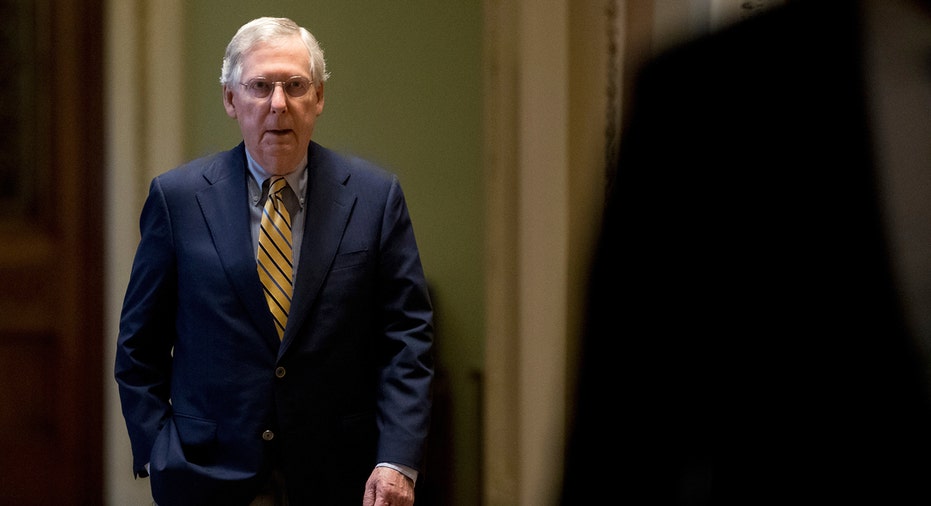Senate health care bill: third GOP senator indicates he might oppose

A third Republican senator angrily indicated Monday he might oppose his party's health care bill in an upcoming showdown vote, a threat that could doom one of the GOP's top priorities to a humiliating, self-inflicted defeat.
Sen. Ron Johnson, a Wisconsin Republican, said moderate GOP senators "basically confirmed" to him that Senate Majority Leader Mitch McConnell, R-Ky., assured them last week that Medicaid cuts planned by the legislation would "never happen" because they are too far in the future.
"It's from my standpoint a pretty serious breach of trust, those comments," Johnson, a conservative re-elected last year, told reporters.
He added, "Last week I was strongly urging colleagues to vote" to begin debating the measure, a critical vote expected as early as next week. "I'm not doing that right now," he said.
Johnson's opposition would be fatal to the Republican drive to repeal much of President Barack Obama's health care overhaul because two other GOP senators have already said they'll vote no: Maine's Susan Collins and Kentucky's Rand Paul. Facing uniform Democratic opposition, McConnell needs 50 of the 52 Republican senators to back the measure so Vice President Mike Pence could cast the tie-breaking vote.
The comments by Johnson came after an expected showdown this week was postponed because Sen. John McCain, R-Ariz., was recovering from a Friday procedure to remove a blood clot above his left eye. His office said he'd recuperate in Arizona for a week, and several senators said Monday they expected McCain, 80, to return quickly.
"We hope John McCain gets better very soon," President Donald Trump said. "Because we miss him. He's a crusty voice in Washington. Plus we need his vote."
Gearing up for that vote, around a half-dozen GOP senators were meeting with Trump and Pence at the White House late Monday in what the White House billed as a strategy session. All senators attending were supporting the bill, and the group included No. 2 Senate GOP leader John Cornyn of Texas and No. 3 leader John Thune of South Dakota.
Conservative support for the legislation has hinged in part on the measure's planned $772 billion in 10-year cuts to Medicaid, the federal-state health insurance program for the poor, disabled and nursing home patients. But only $35 billion of those cuts occur over the next two years; more than half don't take effect until 2024, 2025 and 2026, according to the nonpartisan Congressional Budget Office.
In a written statement, McConnell defended the bill's Medicaid savings but did not deny he'd made the remarks to moderates, which were described last Thursday by The Washington Post. McConnell said capping Medicaid spending "with a responsible growth rate that is sustainable for taxpayers is the most important long-term reform in the bill. That is why it has been in each draft we have released."
Much of the savings would come from limiting each state's federal Medicaid payments to a fixed amount per beneficiary, which would then grow annually to reflect a measure of inflation. Since its inception in 1965, the program has automatically paid states for a share of their eligible Medicaid expenses, whatever the total amount.
With the vote postponed, foes from left and right were trying to make the measure as politically toxic as possible for wavering GOP senators to support it. But the postponement also gave McConnell and the White House more time to cut the deals they need to rescue the imperiled measure.
"The only way we'll get there is with continued hard work, and that's just what we intend to do," McConnell said, signaling that days of bargaining and persuasion with reluctant colleagues lay ahead.
AARP was continuing TV and radio ads aimed at undecided Republican senators in five states, warning, "Your family's coverage could be taken away altogether." Planned Parenthood, labor and liberal groups were holding rallies outside the Capitol. And the conservative Americans for Prosperity was urging members to pressure GOP senators to strengthen a bill that the group's president, Tim Phillips, says doesn't go "anywhere near far enough" to repeal Obama's health care law.
From the other side, Republican Party Chairwoman Ronna Romney McDaniel said the GOP needs to prove that "we can tackle tough issues." The conservative Faith and Freedom Coalition announced its support for a bill that its chairman, Ralph Reed, called "a giant step forward."
On balance, the delay seemed to put McConnell in the tougher spot. In Washington, conventional wisdom dictates that a controversial bill awaiting a vote and under attack from opponents resembles a rotten egg sitting in the sun — the longer it sits, the worse things get.
Underscoring that, the AARP ads targeted five moderate, uncommitted Republicans from states that would be hit hard by the GOP bill's cuts in Medicaid.
They were Lisa Murkowski of Alaska, Colorado's Cory Gardner, Rob Portman of Ohio, Shelley Moore Capito of West Virginia and Dean Heller of Nevada, perhaps the most vulnerable GOP senator in next year's elections.



















